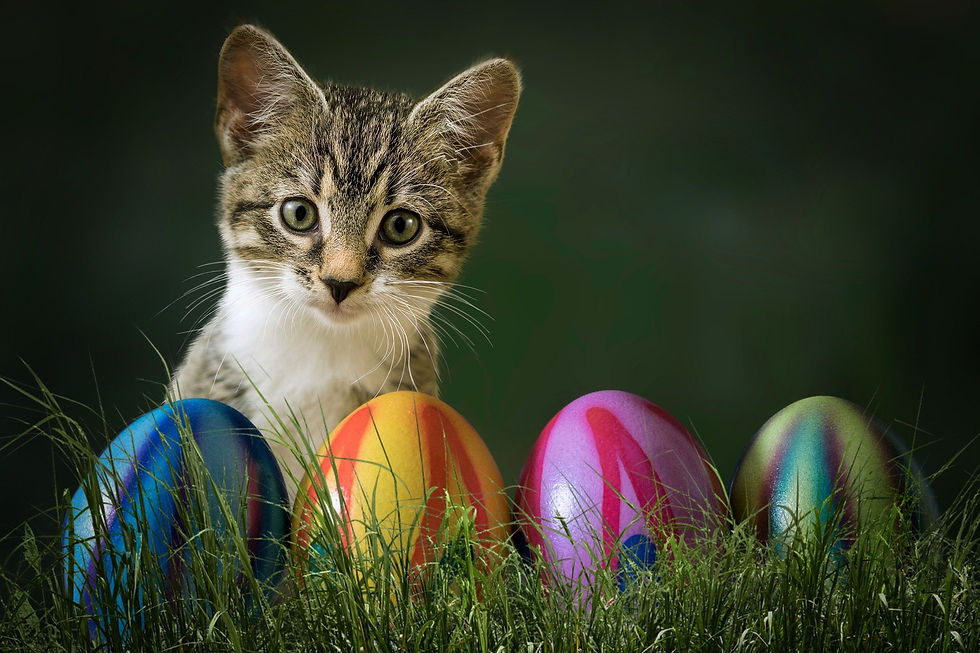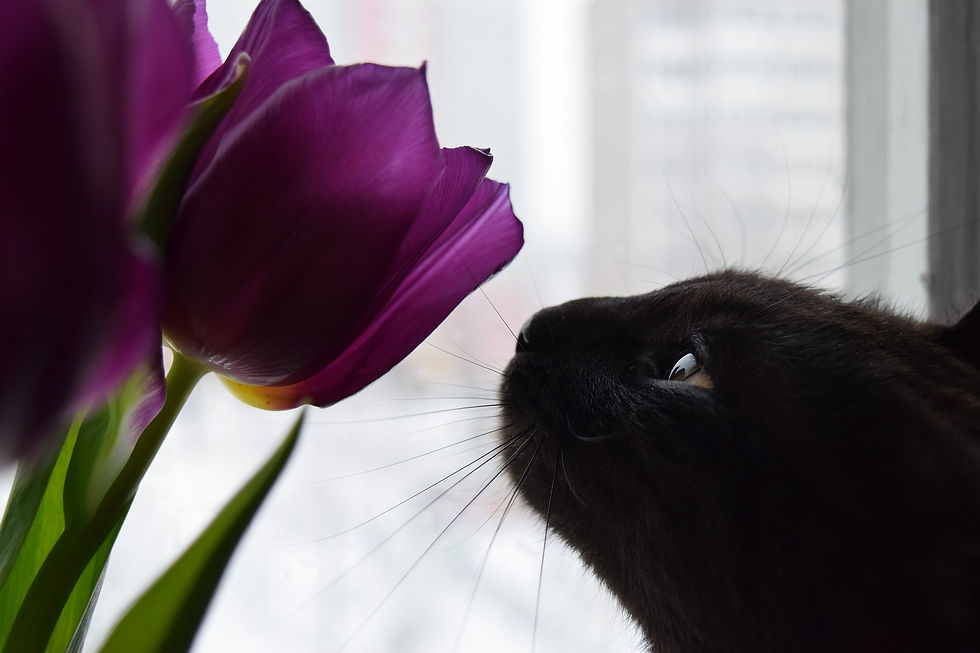The countdown to the start of the Easter holidays has begun: hopefully, most of you will have a few relaxing days off. To make sure that they are not only a celebration for us humans, but also for your cats, I have put together a few do's and don'ts so that you can celebrate together and have lots of fun!

Let's start with the highlights followed by a few more points to consider for a relaxed Easter time with your kitties.
Easter Highlights for Cats:
Easter feast for your cat
Cats are rather picky about their food - mine especially! But especially at Easter (or any other holiday), you can reward them with their favourite food. There are a variety of additional treats available, such as liquid treats or multivitamin pastes that are great for garnishing or decorating. Always remember that good cat food, whether dry or wet, is characterised by a high meat content and, in the best case, is sugar- and grain-free. You can also order healthy snacks and high-quality dry and wet food directly to your home via the Zooplus link below. This is ideal for me, as I only have to do the shopping once a month and don't have to carry heavy bags. With my own 5 cats and 5 street cats that I look after, I also have to buy quite a lot of food!
Easter egg hunt with your cat
Of course, chocolate is absolutely forbidden for cats, as it is toxic for our beloved feline friends. But since they have an excellent sense of smell, a search game is still fun for them. How about hiding some treats for your cat? Their fine nose will sooner or later lead your kitty to success and we humans can enjoy watching them!

Simple DIY craft ideas for new toys
Even the best cat toys get boring at some point. Fortunately, new toys don't have to be expensive. A good example of a simple, homemade favourite toy is, for example, a burrow box. Simply fill a small box or crate (preferably made of washable plastic) with corks, chestnuts, paper balls or similar. Then hide some of your cat's favourite snacks or dry food among the filling material and let him look for them.
Important: The burrow box must be cleaned regularly and the filling material replaced.
Easter Gifts for Cats in Bright Spring Colours
When the first colourful spring flowers are blooming in the sun and maybe spring cleaning is on the agenda anyway, it's especially fun to renew our pets' old assecoires. A chic sleeping cave, a fluffy blanket in a fresh spring colour or even a new sturdy scratching post are Easter gifts that your kitty will surely love!

The DO NOT list for Easter with a cat:
Is chocolate toxic to cats?
The most important info right away: Yes, chocolate is toxic to cats, just as it is to dogs, due to some ingredients like theobromine and caffeine. Normally, our kitties rarely tend to pounce on the chocolate bunnies. However, even the smallest amounts of chocolate are harmful to our cats. Therefore, it is important to consult a vet immediately if you are unsure whether your cat may have eaten some chocolate! Signs of chocolate poisoning include vomiting, diarrhoea, panting and restless behaviour.

Easter decorations for cats
Many of the usual Easter decorations are rather unsuitable or even dangerous for cats. Easter decorations with feathers, for example, are magically attractive to our cats and are more likely to fall victim to their play instinct. So that there is no bad mood on the Easter holidays, it is best to do without feather decorations. Be careful with Easter baskets, decorations or gifts decorated with artificial grass, which is also unfavourable because it can easily be eaten. How about natural Easter decorations with cat grass instead? You can decorate wonderfully with it and it can be eaten by our pets without hesitation.
Toxic plants for cats
After the grey, dark days of winter, we all look forward to the colourful spring flowers. But before we bring the spring messengers into the home, we should ask ourselves: Which plants are poisonous for cats? Unfortunately, some of the most beautiful spring flowers also belong on the NO GO list for cats. Did you know that lily of the valley (Convallaria majalis), monocots (Spathiphyllum species) and common calla or arum (Zantedeschia aethiopica) are all poisonous to your feline companion? They belong to the lily family and unfortunately ALL parts of the plant, including pollen, are highly toxic to cats. The mere contact with the pollen of these plants, which your cat can easily pick up through grooming, is enough for poisoning and can quickly lead to severe kidney damage, which can be fatal. If you suspect that your cat may have been in contact with a lily, contact a vet immediately! Signs of kidney problems are, for example, that your cat no longer drinks or urinates, stops eating and vomits. It is best to inform your guests in advance so that they do not give you any of these flowers at Easter!


Comments